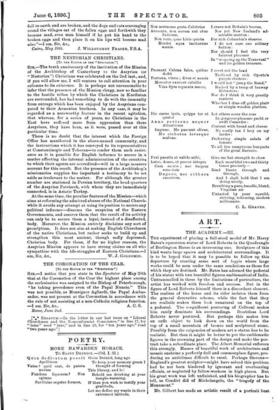THE NESTORIAN CHRISTIANS.
[To THE EDITOR OF THE "SPECTATOR."] Sns,—The tenth anniversary of the institution of the Mission of the Archbishop of Canterbury to the Assyrian (or " Nestorian") Christians was celebrated on the 2nd inst., and, if you will allow me, I will venture to call attention in your -columns to its existence. It is perhaps not unreasonable to infer that the presence of the Mission clergy, now so familiar to the hostile tribes by which the Christians in Kurdistan are surrounded, has bad something to do with the immunity from outrage which has been enjoyed by the Assyrians com- pared to their Armenian brethren. In any case, it may be regarded as a noteworthy feature in the recent agitation, that whereas, for a series of years, no Christians in the East have suffered more from oppression than these Assyrians, they have been, as it were, passed over at this particular time.
There is no doubt that the interest which the Foreign Office has manifested in the above-named community, and the instructions which it has conveyed to its representatives at Constantinople and Teheran—to render them such assist- ance as it is possible for English influence to secure in a matter affecting the internal administration of the countries to which their agents are accredited—will in a large measure account for this result. But the presence of the Archbishop's missionaries supplies too important a testimony to be set aside as irrelevant to the matter. For although the greater number are stationed in Persian territory, the head-quarters of the Assyrian Patriarch, with whom they are immediately -connected, is in Asiatic Turkey.
At the same time, the peculiar feature of the Mission—which aims at reforming the admitted abuses of the National Church, while it avoids any attempt at using its position to secure any political infinence—disarms the suspicion of the Eastern -Governments, and assures them that the result of its activity can only be to secure them a loyal, instead of a disaffected, body. Moreover, the Mission entirely disclaims any sort of proselytism. It does not aim at making English Churchmen of the native Christians, but rather seeks to band up and strengthen this most ancient, though sadly depressed, Christian body. For these, if for no higher reasons, the Assyrian Mission appears to have strong claims on all who sympathise with the life-struggles of Eastern Christians.—I






































 Previous page
Previous page